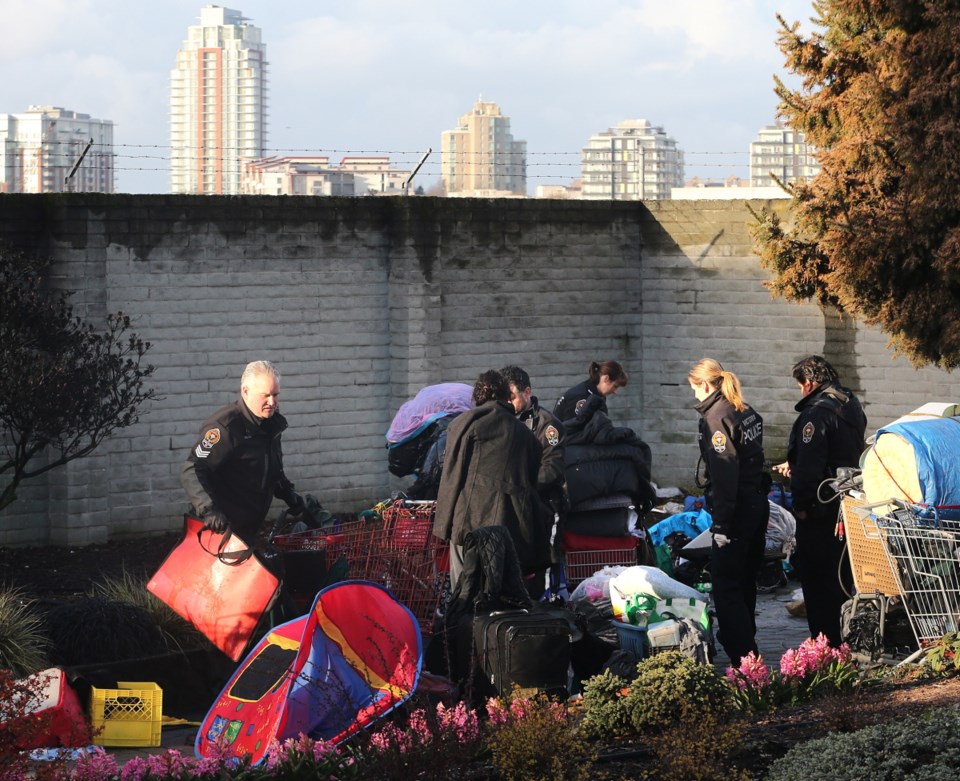 Wednesday noon hour, headed downtown. First in view: a woman going bat-crap crazy on the Blanshard Street sidewalk. High? Mentally ill? Dunno.
Wednesday noon hour, headed downtown. First in view: a woman going bat-crap crazy on the Blanshard Street sidewalk. High? Mentally ill? Dunno.
Turned right, a parka-clad man was poking down Caledonia, shopping cart piled high.
Walked into Centennial Square, where a country band was pumping out a pretty good version of Whiskey River. The audience paid no heed to the homeless man parked on the bench. Street furniture. Invisible.
He was obvious to the councillors peering out the windows of city hall, though. They appear to be the only politicians who actually see the homeless. At least, the councillors are among the few attempting to do something about the issue, which is why it’s hard to give them too much grief for confidently marching into the cow pies of Topaz Park. At least they’re trying.
The thing is, homelessness — and the ineluctably attendant issues of mental health and addictions — shouldn’t be Victoria council’s problem to solve.
It’s not their jurisdiction, and they sure don’t have the money.
What it should be is a federal election issue.
Traditionally, housing has been a matter for senior governments, with Ottawa in particular taking an increasing role after the Second World War.
At one point, the feds even seemed to care. At the end of the 1990s, after the Federation of Canadian Municipalities declared homelessness to be a national crisis, Jean Chrétien put New Brunswick MP Claudette Bradshaw on the file.
Bradshaw, plain-spoken and practical, was armed with $753 million, which was largely distributed through Canada’s municipalities. Upward of $10 million made its way to Victoria, where the beneficiaries included what became Our Place.
Victoria Coun. Chris Coleman recalls accompanying Bradshaw on a tour of the old Streetlink shelter, where one of the clients warmed up immediately upon recognizing her as the woman known as St. Claudette in his native Moncton. Months later, Coleman ran into a street guy who informed him that Bradshaw was still calling every few weeks to keep tabs on his progress.
Alas, we haven’t seen that kind of devotion from Ottawa for a long time. In May, the FCM issued an affordable-housing report documenting the feds’ withdrawal from the scene: “By 2023, less than a decade from now, federal subsidies, which peaked at $1.8 billion in 1995, will have ended for more than 50 per cent of federally assisted social housing. In addition, by 2023, associated federal spending will have declined by almost $1 billion annually: a cumulative reduction of more than $6 billion in federal spending on social housing since 1996.”
So, into the breach steps Victoria council. Alas, while something like 50 per cent of Canada’s tax pie goes to the federal government, only eight per cent goes to municipalities, who are supposed to spend their share on stuff like roads, sewers and parks, not social services.
In reality, any city with a decent-sized downtown has to spend much of its budget on police departments that have become 24-7 social-service agencies by default. That’s why Victoria’s annual policing costs work out to $461 per capita, compared with $263 in Saanich, $257 in Oak Bay and $141 in Langford.
In any case, no municipality has the capacity to tackle homelessness. Even for the feds, it’s a tar pit of an issue. Can’t bomb it into submission like ISIS. Can’t avoid the gooey questions (is there a societal responsibility to house the homeless, is there a responsibility to do so in the most expensive markets in Canada?). Can’t avoid the expense (though maybe Ottawa could fish down the couch to find the $3.1 billion that was supposed to be spent on public safety and anti-terrorism measures, but for which the auditor general said there is no accounting).
As expensive as the answer might be — and as reluctant as some are to devote taxes to people they might see as the authors of their own misfortune — we can’t afford the status quo, either. Coleman, chairman of the FCM’s B.C. caucus, argues it would be cheaper to act than to let things stand. “For every person living rough on the street, it costs the system about $55,000,” he says. By comparison, housing would cost $17,000 to $47,000, depending on how much support the individual needs.
The FCM is trying to draw the federal party leaders into a national debate that would include the homelessness issue. Good luck with that.
Forget Topaz Park and all the other Band-Aids born of desperation. This problem needs a real solution on a national scale. Your federal election candidates should be able to tell you what it is.



